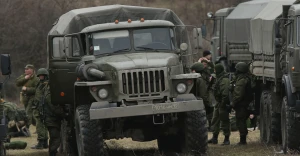
USA - China: Politics of curtseys
The US is trying to neutralize China's Cold War virus
The United States has adopted a new approach, departing from its previous stance of imposing strict sanctions. President Biden has adjusted his negotiating positions to create a pathway for negotiations with Beijing.
During the G7 summit, President Biden attempted to ease tensions with Chinese leader Xi Jinping. Some notable statements include:
The White House administration is considering lifting sanctions against Chinese Defense Minister Li Shangfu, who was blacklisted five years ago for importing fighter jets and missiles from Russia. Beijing has consistently demanded the removal of this personal ban, and the US had previously been unwavering in its stance.
What is more, President Biden reiterated the US commitment to the "one China" policy, stating that Washington does not support any actions by Taiwan to declare independence. While this may not be entirely new, these words carry significant weight within the context of recent discussions. Prior to the G7 summit, President Biden had even issued warnings that the US military would intervene if China engaged in unprovoked military actions against Taiwan. However, the current statement implies that the US aims to assist Taiwan in enhancing its defense capabilities. Doesn’t sound so threatening now, does it?
It is evident that the US leader is assuming a "good cop" role alongside the G7's assertive stance towards China.
The G7 largely disregarded Xi's favored peace plan, which called for a cessation of hostilities along the front line. Instead, the summit participants emphasized that peace negotiations require the withdrawal of Russian troops and equipment from the Ukrainian borders. The document issued by the G7 states that Russia initiated the conflict and holds the power to end it. China's alternative proposal to stop the war along the current frontline was not given significant consideration.
“The G7 largely disregarded Xi's favored peace plan, which called for a cessation of hostilities along the front line. Instead, the summit participants emphasized that peace negotiations require the withdrawal of Russian troops and equipment from the Ukrainian borders. The document issued by the G7 states that Russia initiated the conflict and holds the power to end it. China's alternative proposal to stop the war along the current frontline was not given significant consideration”
The G7 has announced additional sanctions aimed at increasing the costs for Russia and its supporters in their military endeavors. To ensure clarity, the G7 explicitly called upon Beijing to utilize its influence in pressuring Russia to cease its invasion of Ukraine.
Finally, the significance of peace and stability in the Taiwan Strait was emphasized.
In response to the G7's statements, Beijing reacted vehemently in a manner reminiscent of communist tactics. However, it appears that they were already prepared for President Biden's message and responded accordingly.
Xi Jinping convened the "China - Central Asia" summit, extending invitations not to Moscow itself but to several former satellites of the Russian Federation, namely Uzbekistan, Kazakhstan, Kyrgyzstan, Turkmenistan, and Tajikistan.
“In response to the G7's statements, Beijing reacted vehemently in a manner reminiscent of communist tactics. However, it appears that they were already prepared for President Biden's message and responded accordingly. Xi Jinping convened the "China - Central Asia" summit, extending invitations not to Moscow itself but to several former satellites of the Russian Federation, namely Uzbekistan, Kazakhstan, Kyrgyzstan, Turkmenistan, and Tajikistan”
Xi extended cooperation in the economic and defense spheres to his new partners. The accelerated integration of the region with China raises concerns of potential colonization, as it aims to replace Muscovy's influence with Chinese influence. This strategy intends to weaken the Russian Federation in the post-Soviet space, while the Kremlin remains on the sidelines.
The willingness of the USA to pursue diplomacy with the People's Republic of China brings positive prospects for Ukraine. China seeks to assert its geopolitical standing, which doesn't necessarily have to arise from tensions surrounding Taiwan or the Russian aggression against Ukraine. The desired outcome for Ukraine is negotiations between the US and China that not only weaken Muscovy in the near future but also shape its political trajectory, moving away from Putin, imperial posturing, and nuclear weapons within smaller borders. The success of these negotiations will heavily rely on the skill and talent of the negotiators involved.
Source
About the author. Orest Sohar, journalist, chief editor of Obozrevatel
The editors do not always share the opinions expressed by the blog authors.
- News













































